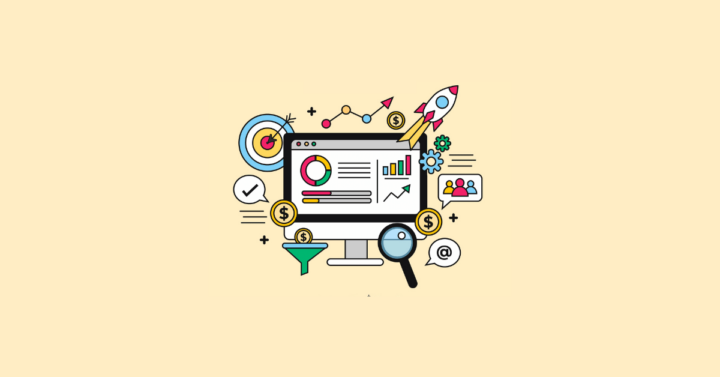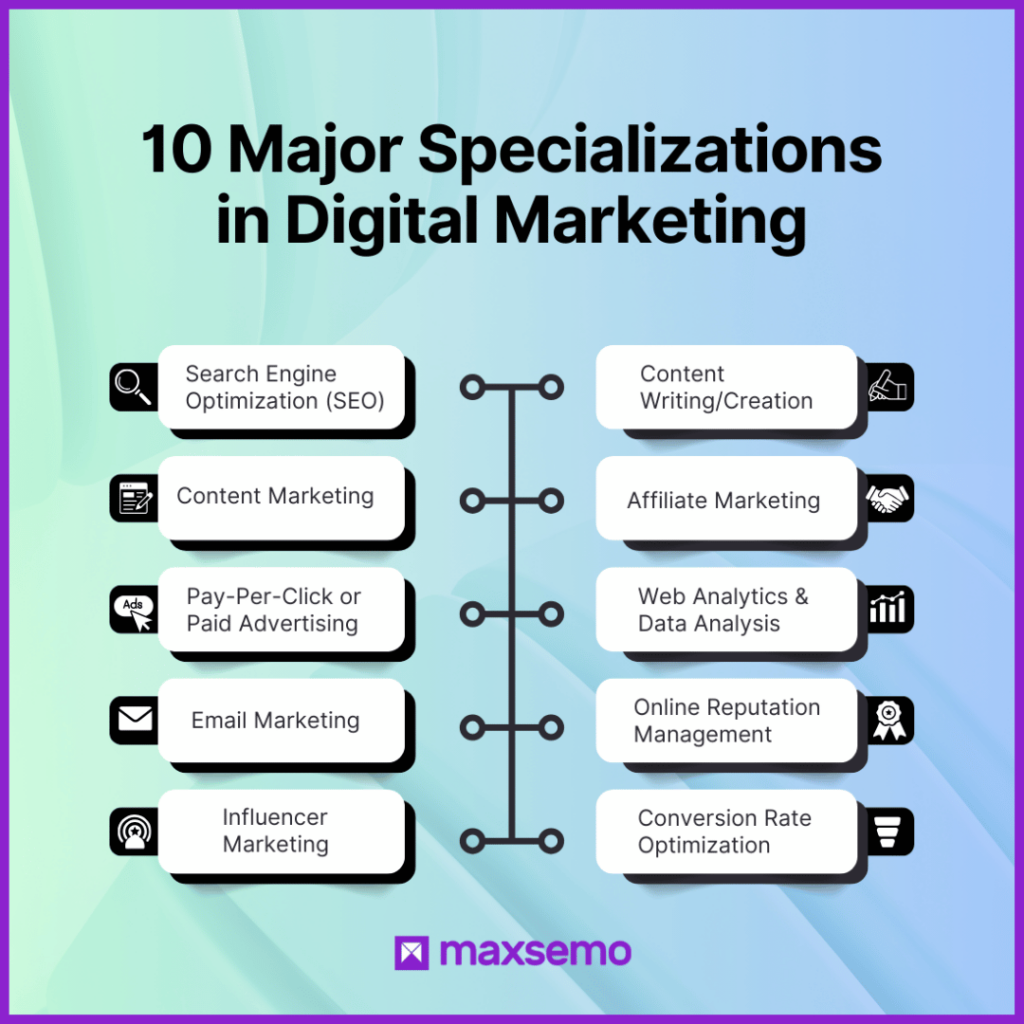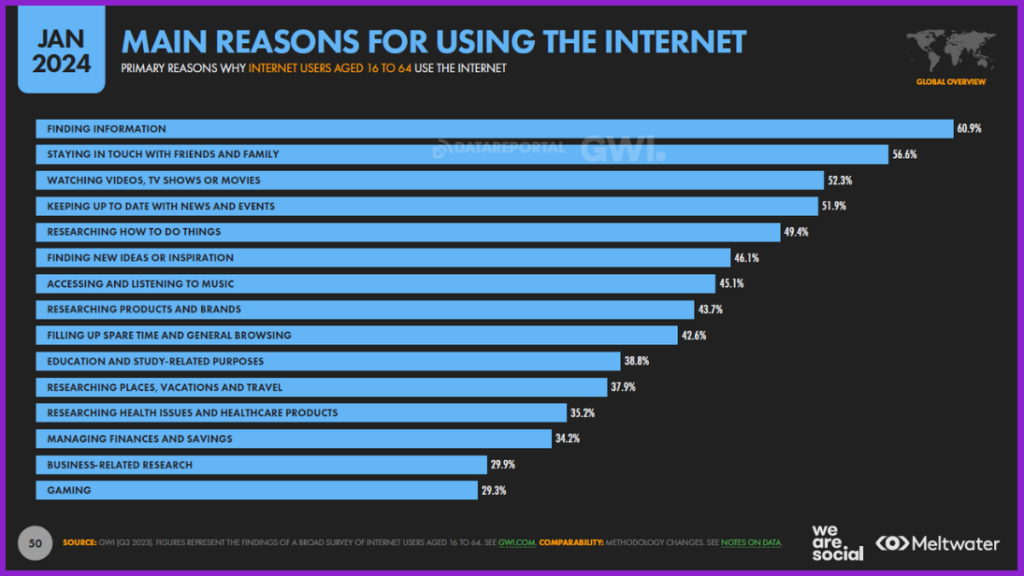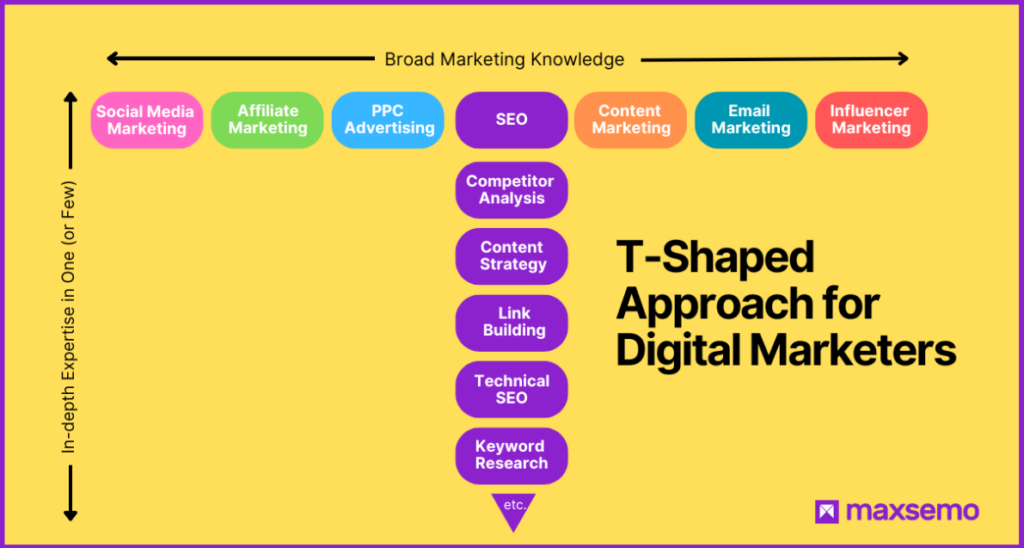
Imagine this: You’re scrolling through your favorite social media platform, and a brand’s post stops you in your tracks.
It’s creative, visually stunning, and feels like it was crafted just for you.
Behind that post is a digital marketer, skillfully combining creativity, data insights, and advanced tools like ChatGPT and MidJourney to tell a compelling story.
In today’s fast-evolving digital landscape, the possibilities in digital marketing are limitless.
Whether you’re passionate about data-driven strategies, love crafting engaging content, or have a talent for managing social media or a website, there’s a place for you in this exciting field.
And in the current scenario, the entry of generative AI tools like Gemini and Claude is taking digital marketing to the next level, helping marketers achieve exceptional results with greater efficiency.
If you’re eager to step into this dynamic world, this blog will guide you on how to start your journey toward a fulfilling career in digital marketing.
Why Choose Digital Marketing as a Career?
Digital marketing is more than just a buzzword; it’s a dynamic field that offers endless opportunities for creativity, growth, and innovation.
Here’s why it’s an excellent career choice in the current scenario:
1. Growing Demand Across Industries
Businesses of all sizes, from startups to global enterprises, are investing heavily in digital marketing with the goals of building brand awareness, generating leads, and for reputation management.
According to Neilsen’s 2024 Annual Marketing Report, global marketers are allocating more budget for digital channels (social media, podcasts, email, etc) than compared to traditional channels (print media, cinema, FM/AM radio, TV, etc).

Whether it’s optimizing websites for search engines, creating engaging social media campaigns, personalized email campaigns, or running data-driven paid ads, companies need skilled digital marketers to stay competitive.
With every industry going digital, the demand for professionals in this field is skyrocketing, making it a highly sought-after career.
2. Diverse Career Paths
Digital marketing offers a wide variety of roles to suit different skill sets and interests.
- If you enjoy writing and storytelling, content creation or copywriting could be your niche.
- If numbers and analytics excite you, roles in Search Engine Optimization (SEO), data analysis, or paid marketing/advertising are a perfect fit.
- Social media enthusiasts can thrive as social media managers or strategists.
- Design-savvy individuals can create visual magic as graphic designers or digital creatives.
This diversity ensures there’s a role for everyone, allowing you to align your career with your strengths and passions. Here’s an infographic that shows different specializations in digital marketing.

3. Flexibility in Work Environments
Digital marketing is synonymous with flexibility. You can choose a work setup that best fits your lifestyle:
- Remote Work: Collaborate with global teams from the comfort of your home.
- Freelancing: Take on projects at your own pace and be your own boss.
- Hybrid Models: Enjoy a mix of in-office collaboration and remote flexibility.
This adaptability makes digital marketing especially attractive for those seeking a work-life balance.
4. The Impact of AI in Revolutionizing the Field
Generative AI tools like ChatGPT, MidJourney, Gemini, Invideo.ai, and other AI-powered marketing platforms are transforming digital marketing into an even more exciting career choice. These tools:
- Automate repetitive tasks like keyword research, email scheduling, and content generation, freeing up time for strategic work.
- Enhance creativity by enabling the rapid creation of visually appealing designs, ad copy, and engaging blog content.
- Provide data-driven insights that help marketers target their audience with unmatched precision.
By integrating these technologies into their workflow, digital marketers can focus on innovation, creativity, and delivering impactful results – making the field more dynamic and rewarding than ever before.
Essential Skills for Digital Marketing in the Current Scenario
Digital marketing has evolved significantly, especially with the integration of generative AI tools and advancements in technology.
To excel in this dynamic field, aspiring marketers need to master a mix of technical and soft skills. Here are the essential skills required in the current scenario:
1. Search Engine Optimization (SEO) Expertise
SEO remains a cornerstone of digital marketing. That’s because finding information is the main reason for using the internet by users (aged 16 to 64 years).

Marketers must understand:
- Keyword research and optimization.
- Technical SEO, website content, and link building strategies.
- The latest trends like voice search optimization, app store optimization, and diversification of SEO to other search platforms (Bing, YouTube, social media, Amazon, etc).
- Tools like Google Analytics, Google Search Console, and third-party tools (like Ubersuggest, Moz, Semrush, Ahrefs, etc) to analyze and improve website performance.
2. Data Analytics and Interpretation
In the age of data-driven marketing, understanding analytics is non-negotiable. Marketers should know how to:
- Extract actionable insights from platforms like Google Analytics, Google Search Console, Google Trends, HubSpot, and Tableau.
- Track metrics such as impressions/views, ROI, conversion rates, and audience engagement.
- Use predictive analytics to anticipate trends and consumer behavior.
3. Content Creation and Marketing
Content is king, but context is queen. Skills in:
- Crafting engaging blog posts, videos, infographics, and more.
- Adapting content for different platforms, from Instagram Reels to WhatsApp messages.
- Leveraging user-generated content (UGC).
- Using AI tools like ChatGPT, Perplexity, and Gemini for brainstorming and content generation.
4. Paid Advertising Proficiency
Running effective paid campaigns on platforms like Google, Facebook, TikTok, and LinkedIn is crucial. This includes:
- A/B testing to optimize ad performance.
- Budget allocation and bid strategies.
- Creating targeted ads for specific audiences using AI-driven tools.
5. Social Media Management
As social media platforms (that includes Reddit as well) continue to evolve, marketers need to:
- Stay updated on trends and platform algorithms.
- Engage audiences with interactive content like polls, stories, and live videos.
- Use scheduling and analytics tools like Hootsuite, Later, Buffer, or Sprout Social.
6. Knowledge of Generative AI Tools
The rise of generative AI has transformed marketing. Skills include:
- Using tools like ChatGPT for personalized email copy, blog ideas, and audience engagement.
- Employing gen AI powered tools like Animoto, Invideo, and Renderforest for creating visually striking graphics.
- Leveraging Gemini and Claude for streamlining workflows and enhancing productivity.
- Experiment with AI agents to automate certain marketing tasks.
7. Adaptability to Emerging Technologies
The digital marketing landscape is constantly evolving. Professionals must:
- Stay updated on emerging trends like augmented reality (AR), voice search, and Web3 technologies.
- Experiment with new tools and platforms to remain ahead of the curve.
- Optimize your current martech stack to make it lean and integrate well – to get higher impact.
8. Soft Skills: Creativity, Communication, and Collaboration
While technical skills are critical, soft skills like creativity, effective communication, and teamwork are equally important for brainstorming ideas, crafting compelling narratives, and working across teams.
It is very difficult to master all niches/specializations under the digital marketing domain, instead you can adopt a T-shaped approach.
In this approach, you can have in-depth knowledge in one (or few) specialization (say SEO and Google Ads) and considerable experience in other areas (Linkedin ads, email, content marketing, affiliate marketing, etc.) as shown in the infographic below.

Steps to Start Your Career in Digital Marketing
Embarking on a digital marketing career might feel overwhelming, but with the right approach, you can build a strong foundation and grow in this dynamic field.
Here’s a step-by-step guide to help you get started:
1. Understand the Basics of Digital Marketing
Start by familiarizing yourself with the key areas of digital marketing:
- Search Engine Optimization (SEO)
- Content marketing
- Social media marketing
- Pay-per-click (PPC) or paid advertising
- Email marketing
- Web analytics and data interpretation
You can explore online (free) resources like blogs, ebooks, podcasts, and YouTube videos to build a foundational understanding. For instance, Maxsemo provides advanced tips and strategies in digital marketing.
2. Enroll in Digital Marketing Courses
Invest in learning by joining reputable courses.
Platforms like Coursera, Udemy, Semrush Academy, and HubSpot Academy offer structured learning paths, while Google offers free certification programs such as Google Digital Garage (Fundamentals of Digital Marketing), Google Ads and Google Analytics Certifications.
Similarly, Meta offers digital marketing certification courses through their Meta Blueprint platform and Linkedin offers certification courses via Linkedin Marketing Labs.
These courses provide hands-on experience and certifications that can boost your resume.
3. Develop a Strong Online Presence
As a digital marketer, your online presence speaks volumes.
- Build your personal brand (as an employee, freelancer, or entrepreneur).
- Create a LinkedIn profile highlighting your skills and interests.
- Share insightful content on platforms like Medium, Tumblr, or your own website blog.
- Use social media (platform of your choice) to showcase your knowledge and engage with industry professionals.
4. Build a Portfolio
Employers value practical experience. Create a portfolio by:
- Working on personal projects, such as optimizing your blog or managing social media for a small business.
- Offering free or low-cost services to local businesses or non-profits.
- Taking part in internships to gain hands-on experience.
Include case studies (if any) in your portfolio to showcase your impact.
5. Learn Generative AI Tools
In the current scenario, generative AI is a game-changer for digital marketing.
- Use tools like ChatGPT for content creation and brainstorming.
- Experiment with MidJourney, Canva and Invideo for designing graphics and visuals.
- Explore platforms like Gemini or Claude to streamline workflows.
Understanding these tools will make you stand out in the job market.
6. Master Digital Marketing Tools
Familiarize yourself with essential tools used in the industry, such as:
- SEO: Google Search Console, Bing Webmaster Tools, YouTube Studio
- Social Media: Sprout Social, Hootsuite, Buffer, Meta Business Suite, Later
- Email Marketing: Brevo, Mailchimp, ConvertKit
- Analytics: Google Analytics, Tableau, Microsoft Clarity, Screaming Frog
Hands-on experience with these tools demonstrates your readiness for real-world challenges.
There are so many marketing tools/platforms out there (like Ubersuggest, Semrush, Ahrefs, Moz, etc) and you can master those ones that comes under your job requirements.
7. Network and Stay Updated
Build connections in the industry to learn from others and uncover job opportunities:
- Attend webinars, industry meetups, and conferences.
- Join online communities and forums like Reddit’s r/digital_marketing, r/SEO, and r/SocialMediaMarketing.
- Follow thought leaders on LinkedIn and X (Twitter) for the latest trends.
8. Keep Learning and Upskilling
The digital marketing landscape evolves rapidly. Stay competitive by:
- Following industry blogs like Neil Patel, Search Engine Journal, Moz, and HubSpot.
- Learning advanced topics like AI marketing, programmatic advertising, or AR/VR campaigns.
- Upskilling with micro-certifications in areas like data analytics or storytelling.
- Keep on learning and upskilling even after you gained years of experience in the field (whether you become a CMO, Marketing Director, Digital Marketing Manager, or a Digital Marketing Consultant).
Finding Your First Job in Digital Marketing
Landing your first job in digital marketing might seem challenging, but with the right strategies and mindset, you can successfully break into the industry.
Here’s how to get started:
1. Build a Solid Foundation
- Showcase your learning: Highlight certifications from platforms like Google Digital Garage, HubSpot, or Coursera in your resume.
- Create a portfolio: Include case studies from personal projects, freelance gigs, or internships. Demonstrate how you applied your skills to achieve measurable results, such as increasing website traffic or engagement.
- Build Your Personal Brand: As mentioned earlier, build your personal brand to attract potential employers or clients. Apply what you’ve learnt to promote yourself online (in an organic way).
- Networking is a Must:
2. Search for Entry-Level Opportunities
Focus on roles like:
- Digital Marketing Assistant/Executive
- SEO Analyst
- Social Media Coordinator
- Content Marketing Intern, and many more.
Look for these opportunities on job boards like Monster, Naukri, LinkedIn, Glassdoor, and Indeed. Use filters like location, work mode, and experience level to find jobs suitable to your requirements.
3. Tailor Your Resume and Cover Letter
Make your application stand out:
- Customize your resume to include relevant skills and keywords from the job description.
- Highlight any digital marketing projects, even if they’re personal or academic.
- Craft a compelling cover letter that reflects your enthusiasm and how you can add value to the company.
4. Gain Experience with Freelance Projects
- Start small: Offer your services to small businesses, local organizations, or non-profits to gain hands-on experience.
- Use freelance platforms: Sign up on Fiverr, Upwork, or Toptal to find entry-level projects. Or, you can use Linkedin or Reddit to find freelance opportunities.
Freelancing not only builds your portfolio but also provides a chance to explore different areas of digital marketing.
5. Prepare for Interviews
- Research the company, its campaigns, and competitors.
- Be ready to discuss how you’ve applied digital marketing concepts in real-world scenarios.
- Familiarize yourself with tools, trends, and metrics relevant to the role.
- Practice answering common interview questions, such as – “How would you create a social media campaign for XYZ brand?” or “How do you measure the success of a digital marketing campaign?”.
- When creating your resume, mention only those things you already know or have expertise in it. Don’t try to fake it as it will lead to a negative first impression (of you) when interviewed by an employer or a client.
6. Stay Persistent and Open to Learning
Finding your first job can take time, but persistence is key:
- Don’t hesitate to apply for internships or part-time roles. These often transition into full-time positions.
- Learn from rejections. Seek feedback from interviewers to improve your approach.
- Keep updating your skills by exploring emerging trends like AI-driven marketing and data analytics.
Final Thoughts
Starting a career in digital marketing is an exciting journey filled with endless possibilities.
In the current scenario, where emerging technologies like gen AI and AR/VR are reshaping the industry, there has never been a better time to dive in. By mastering essential skills, staying adaptable, and leveraging the right tools, you can carve a successful path in this dynamic field.
Remember, persistence and a willingness to learn are your greatest allies. Embrace the challenge, and your digital marketing career can thrive, unlocking growth and opportunities like never before!
